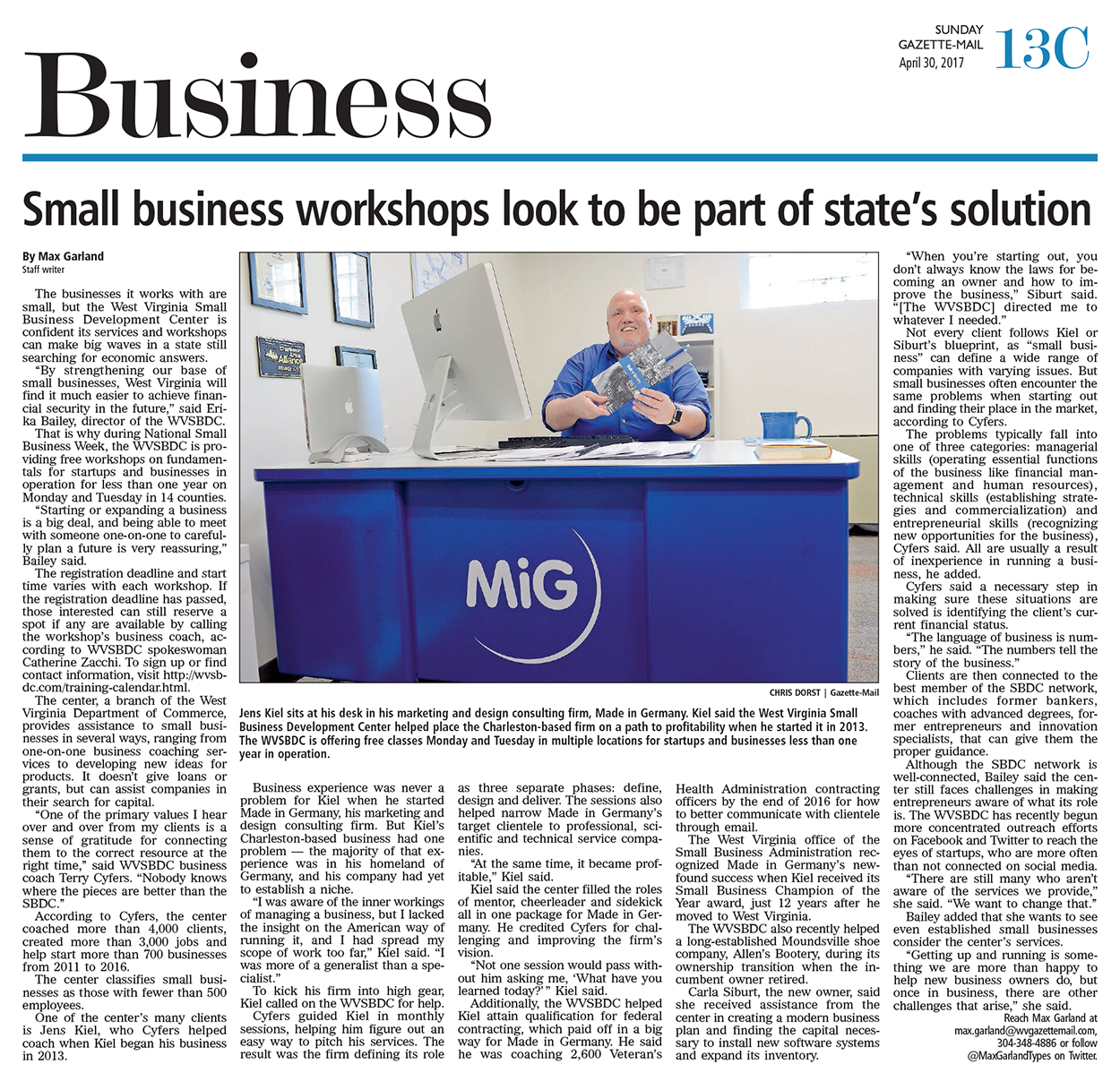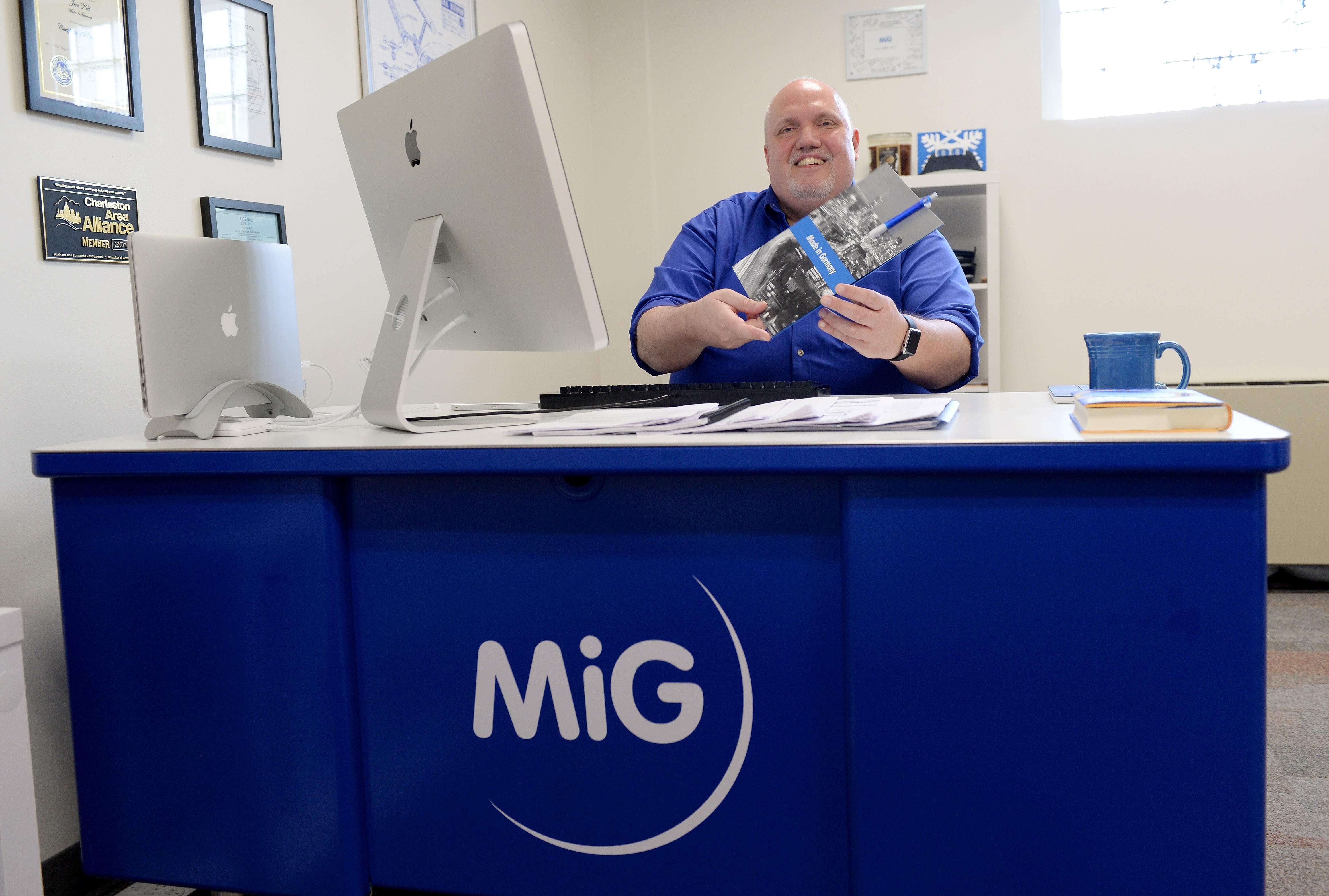Small Business Workshops Look to Be Part of West Virginia’s Solution
Posted on April 30, 2017
Jens Kiel sits at his desk in his marketing and design consulting firm, Made in Germany. Kiel said the West Virginia Small Business Development Center helped place the Charleston-based firm on a path to profitability when he started it in 2013. The WVSBDC is offering free classes Monday and Tuesday in multiple locations for startups and businesses less than one year in operation.
By Max Garland , Staff writer, Charleston Gazette-Mail, April 29, 2017
Photo credit: Chris Dorst, Charleston Gazette-Mail
The businesses it works with are small, but the West Virginia Small Business Development Center is confident its services and workshops can make big waves in a state still searching for economic answers.
“By strengthening our base of small businesses, West Virginia will find it much easier to achieve financial security in the future,” said Erika Bailey, director of the WVSBDC.
That is why during National Small Business Week, the WVSBDC is providing free workshops on fundamentals for startups and businesses in operation for less than one year on Monday and Tuesday in 14 counties.
“Starting or expanding a business is a big deal, and being able to meet with someone one-on-one to carefully plan a future is very reassuring,” Bailey said.
The registration deadline and start time varies with each workshop. If the registration deadline has passed, those interested can still reserve a spot if any are available by calling the workshop’s business coach, according to WVSBDC spokeswoman Catherine Zacchi. To sign up or find contact information, visit their training calendar.
The center, a branch of the West Virginia Department of Commerce, provides assistance to small businesses in several ways, ranging from one-on-one business coaching services to developing new ideas for products. It doesn’t give loans or grants, but can assist companies in their search for capital.
“One of the primary values I hear over and over from my clients is a sense of gratitude for connecting them to the correct resource at the right time,” said WVSBDC business coach Terry Cyfers. “Nobody knows where the pieces are better than the SBDC.”
According to Cyfers, the center coached more than 4,000 clients, created more than 3,000 jobs and help start more than 700 businesses from 2011 to 2016.
The center classifies small businesses as those with fewer than 500 employees.
One of the center’s many clients is Jens Kiel, who Cyfers helped coach when Kiel began his business in 2013.
Business experience was never a problem for Kiel when he started Made in Germany, his marketing and design consulting firm. But Kiel’s Charleston-based business had one problem — the majority of that experience was in his homeland of Germany, and his company had yet to establish a niche.
“I was aware of the inner workings of managing a business, but I lacked the insight on the American way of running it, and I had spread my scope of work too far,” Kiel said. “I was more of a generalist than a specialist.”
To kick his firm into high gear, Kiel called on the WVSBDC for help.
Cyfers guided Kiel in monthly sessions, helping him figure out an easy way to pitch his services. The result was the firm defining its role as three separate phases: define, design and deliver. The sessions also helped narrow Made in Germany’s target clientele to professional, scientific and technical service companies.
“At the same time, it became profitable,” Kiel said.
Kiel said the center filled the roles of mentor, cheerleader and sidekick all in one package for Made in Germany. He credited Cyfers for challenging and improving the firm’s vision.
“Not one session would pass without him asking me, ‘What have you learned today?’ ” Kiel said.
Additionally, the WVSBDC helped Kiel attain qualification for federal contracting, which paid off in a big way for Made in Germany. He said he was coaching 2,600 Veteran’s Health Administration contracting officers by the end of 2016 for how to better communicate with clientele through email.
The West Virginia office of the Small Business Administration recognized Made in Germany’s newfound success when Kiel received its Small Business Champion of the Year award, just 12 years after he moved to West Virginia.
The WVSBDC also recently helped a long-established Moundsville shoe company, Allen’s Bootery, during its ownership transition when the incumbent owner retired.
Carla Siburt, the new owner, said she received assistance from the center in creating a modern business plan and finding the capital necessary to install new software systems and expand its inventory.
“When you’re starting out, you don’t always know the laws for becoming an owner and how to improve the business,” Siburt said. “[The WVSBDC] directed me to whatever I needed.”
Not every client follows Kiel or Siburt’s blueprint, as “small business” can define a wide range of companies with varying issues. But small businesses often encounter the same problems when starting out and finding their place in the market, according to Cyfers.
The problems typically fall into one of three categories: managerial skills (operating essential functions of the business like financial management and human resources), technical skills (establishing strategies and commercialization) and entrepreneurial skills (recognizing new opportunities for the business), Cyfers said. All are usually a result of inexperience in running a business, he added.
Cyfers said a necessary step in making sure these situations are solved is identifying the client’s current financial status.
“The language of business is numbers,” he said. “The numbers tell the story of the business.”
Clients are then connected to the best member of the SBDC network, which includes former bankers, coaches with advanced degrees, former entrepreneurs and innovation specialists, that can give them the proper guidance.
Although the SBDC network is well-connected, Bailey said the center still faces challenges in making entrepreneurs aware of what its role is. The WVSBDC has recently begun more concentrated outreach efforts on Facebook and Twitter to reach the eyes of startups, who are more often than not connected on social media.
“There are still many who aren’t aware of the services we provide,” she said. “We want to change that.”
Bailey added that she wants to see even established small businesses consider the center’s services.
“Getting up and running is something we are more than happy to help new business owners do, but once in business, there are other challenges that arise,” she said.
Reach Max Garland at max.garland@wvgazettemail.com, 304-348-4886 or follow @MaxGarlandTypes on Twitter.


